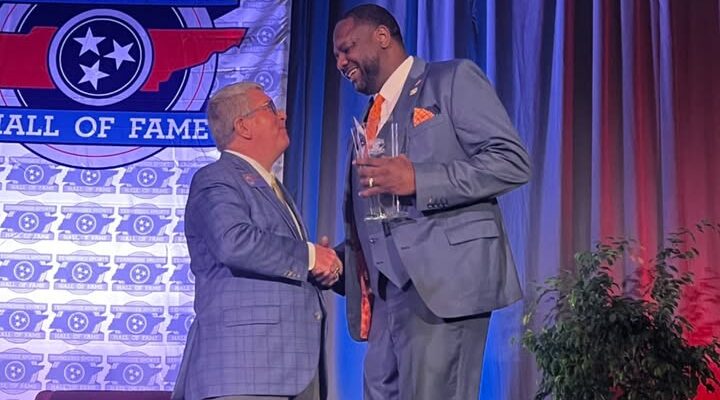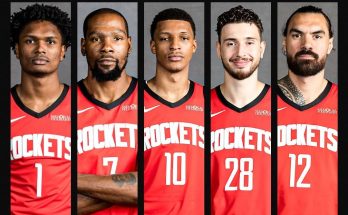Several former Vols were on the list of individuals who were awarded the highest sports accolade in the State of Tennessee on
On a momentous Saturday evening in mid‑July 2025, the Tennessee Sports Hall of Fame convened at the Omni Nashville Hotel to celebrate its 2025 class of inductees. This year, the University of Tennessee—known affectionately as the Vols—was prominently represented, with seven individuals whose connections to the school had left an indelible mark on Tennessee’s sports heritage being recognized with the state’s highest sports honors. Their selection spotlighted a legacy of athletic excellence, coaching wizardry, and program-building across multiple generations and sports.
First among the honorees was Andy Kelly, the standout quarterback who had helmed the Vols during a pivotal period in the early 1990s. Under Kelly’s leadership the team clinched the SEC championship in 1990 and secured a thrilling Sugar Bowl victory over Virginia. When he departed Knoxville, Kelly held the career records for passing yards and touchdowns—milestones that cemented his status as one of Tennessee’s most prolific signal-callers ). His induction reflected not only the statistical prowess he demonstrated but also his role in defining an era for Volunteer football.
Sharing the spotlight was Deon Grant, whose defensive intensity and playmaking on the field helped solidify his place in Vols lore. A senior in 1998, Grant anchored the secondary of Tennessee’s national championship squad, earning First Team All‑American honors. His excellence extended beyond college: Grant would enjoy a 12‑year NFL career capped with a Super Bowl XLVI championship featuring the New York Giants (Rocky Top Talk). Grant’s journey—from a lock-down college defender to a Super Bowl winner—embodied the full arc of athletic achievement.
On the coaching side, Doug Mathews was recognized for his contributions behind the scenes, honing the skills of running backs during the 1980s under head coach Johnny Majors. Mathews guided athletes like Reggie Cobb and Johnnie Jones, instilling in them the fundamentals and discipline that defined their careers (Rocky Top Talk). Though less visible than players on the field, Mathews’ impact was profound: he shaped the running game and helped establish a strong tradition of execution and preparation in Tennessee football.
In men’s basketball, Ron Slay earned his place in the Hall of Fame with a career that combined individual accolades and program significance. Slay was named SEC Player of the Year in 2003, becoming the first Tennessee player to receive that honor since 1987—a near two‑decade gap (Rocky Top Talk). He also garnered All‑America honors, later being included on Tennessee’s Basketball All‑Century Team. Slay’s induction acknowledged his role in revitalizing Tennessee basketball and carrying the program forward in the early 2000s.
On the women’s side, the storied history of Lady Vol basketball was represented by two icons: Chamique Holdsclaw and Tamika Catchings. Holdsclaw, whose college career spanned from 1995 to 1999, helped lead Tennessee to three consecutive NCAA championships in 1996, 1997, and 1998—including a historic undefeated 39‑0 season in 1998 (Wikipedia). A four‑time Kodak All‑American, she remains Tennessee’s all‑time leading scorer and rebounder, holding those records in both men’s and women’s basketball (Wikipedia). Her legacy is firmly woven into the fabric of Lady Vols history.
Tamika Catchings, a key contributor on those same championship teams, was inducted alongside her former teammate. Playing from 1997 to 2001, Catchings was recognized as a four‑time All‑American and NCAA Freshman of the Year, executing standout performances during the team’s perfect 1997–98 campaign (University of Tennessee Athletics). Other collegiate honors included the Naismith and AP Player of the Year awards in 2000, encapsulating her dominance in college hoops (Wikipedia). Catchings followed her Tennessee career with a decorated fifteen‑year WNBA tenure, which included a 2012 WNBA championship and Finals MVP honors, as well as four Olympic gold medals. Her state hall of fame induction came after she had already been enshrined in the Naismith Memorial Basketball Hall of Fame in 2020 (University of Tennessee Athletics, Wikipedia). At the induction, the Hall of Fame’s executive director praised her “incredible legacy,” reflecting a lifetime of athletic influence (University of Tennessee Athletics).
Finally, Chris Woodruff rounded out the list of inductees. Woodruff, a standout tennis player from 1991 to 1993, had returned to Knoxville as head coach, building the program into a top-tier competitor. Under his leadership, Tennessee claimed the SEC championship in 2021 and reached the NCAA semifinals in 2021 and 2022 (Rocky Top Talk). That success earned him a contract extension through the 2030 season, affirming both his capabilities and the program’s future under his guidance (Rocky Top Talk).
In addition to the seven former student-athletes and coaches, longtime Tennessee men’s basketball coach Rick Barnes was honored with the Pat Summitt Lifetime Achievement Award—paying homage to his ten seasons at Tennessee, which yielded a 232–109 record and multiple NCAA tournament appearances (Rocky Top Talk).
Taken as a group, the 2025 Tennessee Sports Hall of Fame class from the University of Tennessee showcased the depth, diversity, and sustained excellence of the Vols across multiple sports and eras. From football to basketball to tennis, the inducted individuals represented different generation-spanning contributions: on-field excellence, championship celebrations, defensive strength, program-building, and social impact.
Their presence in Nashville that night served not just as personal recognition but as a broader testament to Tennessee’s ability—in both athletic development and institutional support—to nurture talent that can excel at the highest levels. Kelly’s aerial exploits, Grant’s defensive swagger, and Mathews’ mentorship underscored the Vols’ football legacy. Slay’s sharp shooting and basketball IQ reminded fans of the men’s team’s emerging regime in the early 21st century. Holdsclaw and Catchings cemented the Lady Vols’ golden era, while Woodruff’s rise from player to program builder demonstrated Tennessee’s continued investment in tennis greatness.
The award ceremony itself, hosted in Nashville, also served as a celebration of state pride and sporting heritage. Many of the inductees hailed from within Tennessee or had come to define their sport within the state’s cultural milieu. Their careers inspired thousands of young athletes—from Knoxville to Memphis to Chattanooga—who had watched Vols games and dreamed of following in their footsteps. Public acknowledgment from the Hall of Fame underscored this, connecting past achievements with the future of Tennessee sports.
Inductees’ speeches reflected humility and gratitude. Kelly acknowledged his offensive line and coaching staff; Grant praised his Tennessee coaches for laying the groundwork for his professional success; Slay remembered the late Coach Thompson and the sense of family around his team; Holdsclaw and Catchings both paid tribute to Pat Summitt’s motivational spirit and the synergy of the Lady Vols dynasty. Woodruff spoke of honoring his mentors and investing in future Vols athletes.
Media coverage emphasized both individual accolades and the collective significance. Local outlets highlighted how the football inductees had reached national prominence, while basketball awards brought renewed attention to Tennessee’s ongoing quest for NCAA glory. Tennis coverage emphasized the rarity of sustained SEC dominance by a program led by a former player-turned-coach like Woodruff.
Of the honorees, the stories of Catchings and Holdsclaw were particularly compelling: two young women who had not only led the Lady Vols to three‑peat championships but also broke records, garnered national attention, and forged careers that led to professional and Olympic triumphs. Those watching that night in Nashville saw a full-circle moment—girls who had grown up idolizing earlier Lady Vols and had themselves become legends now being enshrined for their impact.
Beyond the stage, the presence of high‑school athletes and young Tennessee fans in the audience provided a visual testament to the enduring appeal of the Volunteer State’s sports programs. Parents brought children who might one day again take Tennessee’s stages in football stadiums, basketball arenas, or tennis courts.
In sum, the 2025 Tennessee Sports Hall of Fame induction ceremony crystallized decades of Volunteer athletic achievement. Seven inductees directly tied to the University of Tennessee—Kelly, Grant, Mathews, Slay, Holdsclaw, Catchings, and Woodruff—were recognized alongside Rick Barnes, representing the breadth of Vols influence. This acknowledgment combined individual honor and institutional pride, illuminating stories of talent honed in Knoxville, landmark championships in Tennessee orange, and legacies carried into professional and coaching careers beyond the state. The evening stood as both tribute and beacon: a nod to a storied past and inspiration for future Volunteer athletes.



